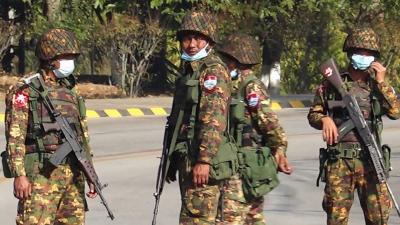WFP warns of affect of Myanmar's political unrest on poor

NAYPYITAW – The United Nations World Food Programme (WFP) today warned of rising food and fuel prices as the current political unrest in Myanmar starts to impact supply chains and markets.
Across the country, the cost of rice showed an average increase of 3 percent on monitored markets from mid-January to mid-February. However, in a few townships in Kachin state, such as Bhamo and Putao, the increases are 20-35 percent.
“These initial signs are troubling, especially for the most vulnerable people who were already living meal-to-meal,” said WFP Myanmar Country Director Stephen Anderson. “Coming on top of the COVID-19 pandemic, if these price trends continue they will severely undermine the ability of the poorest and most vulnerable to put enough food on the family table.”
Steep spikes in oil prices have been observed in northern Rakhine where the average retail price of cooking oil increased by 27 percent from January to February, and in Maungdaw township the price of pulses jumped 15 percent. Increases in the price of cooking oil have also been observed in central Rakhine State (11 percent) and in Tanintharyi Region (14 percent).
WFP has also noted an increase of 15 percent in the cost of fuel countrywide since 1 February, raising concerns about further food price hikes. In northern Rakhine, the price of petrol has increased by 33 percent and diesel by 29 percent.
These rising food and fuel prices are compounded by the near paralysis of the banking sector, slowdowns in remittances, and widespread limits on cash availability.
In order to ensure life-saving monthly cash and food distributions continue to over 360,000 people – mainly internally displaced and living in camps – WFP is building a contingency food stock, which would allow a switch from cash to in-kind food assistance in case cash availability continues to be limited, or market supply is constrained.
“WFP reiterates the call of the United Nations Secretary-General for the will of the Myanmar people expressed in recent elections to be respected,” said Anderson. “At WFP we know all too well how hunger can quickly follow when peace and dialogue are sidelined.”
WFP’s food price data were collected from more than 70 townships, across 100 markets and 250 plus separate traders and shops. While monitoring the new trends closely, WFP’s first priority is to ensure its monthly life-saving food assistance continues to reach those in need.


